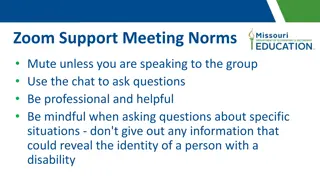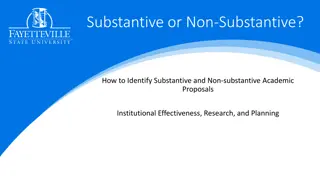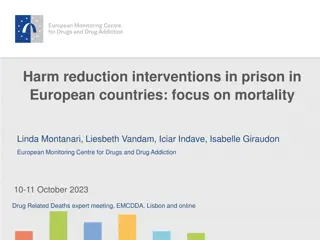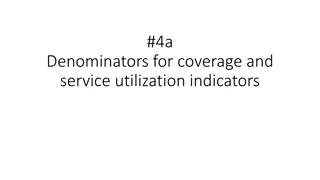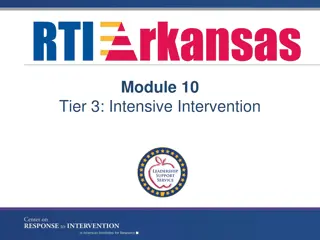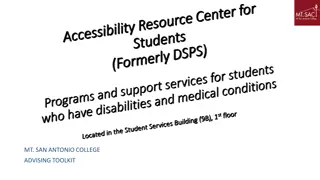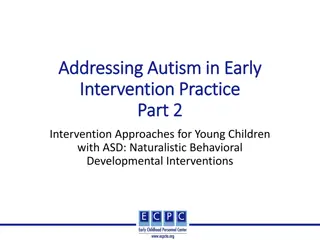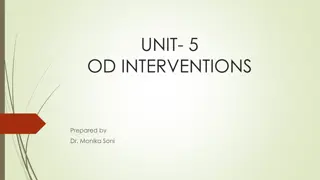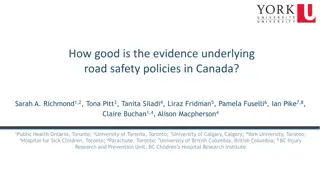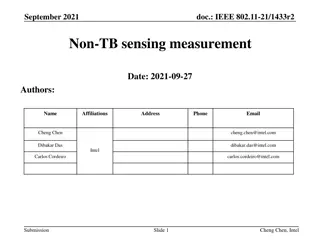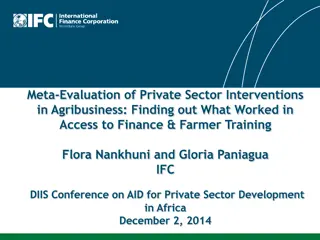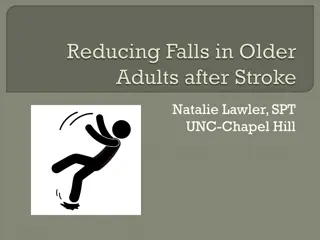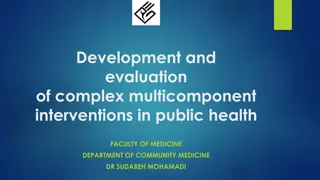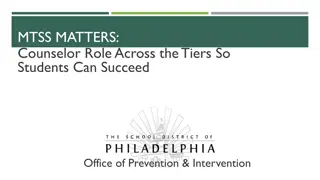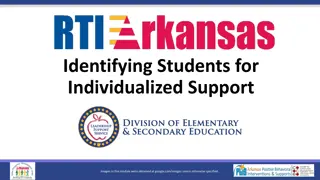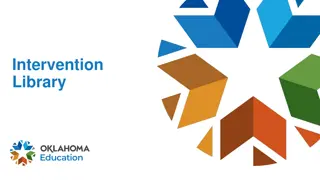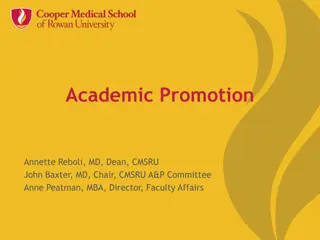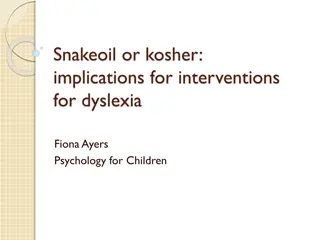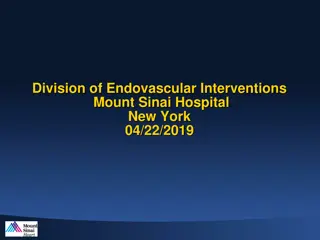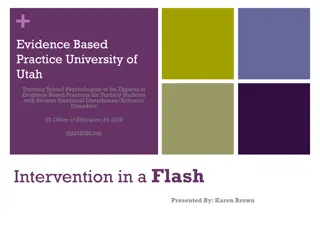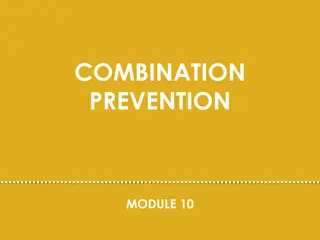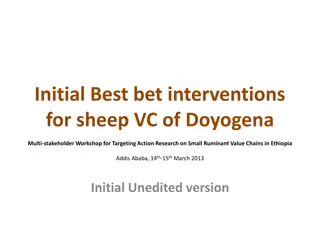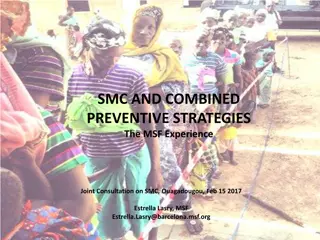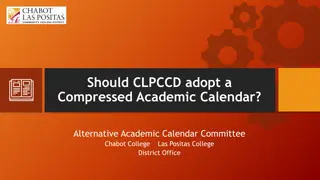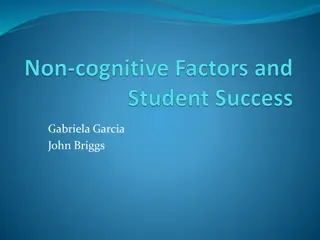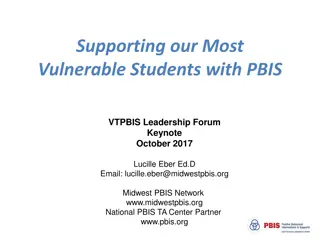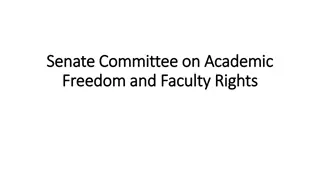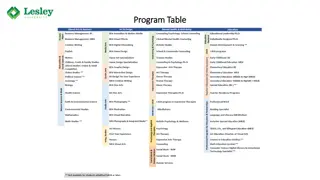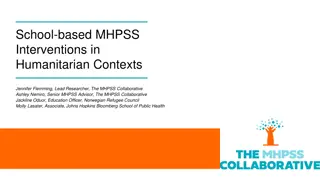Exploring Community Justice Interventions for Alcohol-Related Offenses
This presentation delves into the various community justice options available for individuals involved in alcohol-related offenses. It outlines the justice process post charges, community justice programs, national policies, successful examples like CPOs with alcohol treatment, challenges faced, and
1 views • 22 slides
Effective Strategies for Speech and Language Interventions in Education
Explore the crucial norms for Zoom meetings, guidelines for speech and language interventions, and the roles of speech-language pathologists in schools. Learn why these interventions are essential, focusing on providing educational relevance, cultural sensitivity, and supporting student progress wit
2 views • 40 slides
Identifying Substantive and Non-Substantive Academic Proposals
Learn how to distinguish between substantive and non-substantive academic proposals in institutional effectiveness, research, and planning. Discover the criteria and processes for identifying these proposals, including which ones require specific approvals and reviews from academic committees. Gain
0 views • 23 slides
Insights on Harm Reduction Interventions in European Prisons
Explore findings on mortality rates, drug use prevalence, and interventions in European prisons. Discover the impact of drug-related deaths, including NPS use, and the effectiveness of interventions like OAT and harm reduction strategies. Learn about the challenges and opportunities in addressing dr
0 views • 15 slides
Comprehensive Assessment of Denominators for Population Coverage and Service Utilization Indicators
This document outlines the importance of denominators in determining the percentage of the population reached by healthcare services. It covers a range of indicators for both preventive and curative services, providing insights on population projections, target populations, and specific intervention
2 views • 20 slides
Understanding Tier 3 Intensive Intervention in RTI Systems
This content delves into the critical features of Tier 3 interventions within Response to Intervention (RTI) frameworks. It covers the objectives of Tier 3 systems, designing and implementing interventions, problem-solving processes, essential components of RTI, evidence standards for interventions,
0 views • 64 slides
Access Center Services at Mt. San Antonio College
Mt. San Antonio College offers a range of support services through the Access Center to assist students with disabilities in accessing courses and programs. These services include academic, career, and personal counseling, assistance with academic accommodations, classes on academic strategies, and
0 views • 9 slides
Understanding Non-Aqueous Solvents: Types and Classification
Inorganic non-aqueous solvents play a crucial role in chemical research and industry. This article by Dr. Princy K.G. delves into the classification of solvents based on protonicity, polarity, and aqueous vs. non-aqueous nature. It explores the types of non-aqueous solvents, such as protonic and non
1 views • 29 slides
Mastering Academic Writing: Strategies for Success
Academic writing is a formal style of writing with specific characteristics such as accuracy, brevity, and clarity. Understanding academic style is crucial for success in your course as it reflects your engagement with the content. Successful academic writers read, learn new vocabulary, and have a s
0 views • 23 slides
Understanding Naturalistic Developmental Behavioral Interventions for Children with ASD
This resource explores the history of autism interventions, focusing on Naturalistic Developmental Behavioral Interventions for young children with ASD. It covers theoretical approaches, specific needs met by NDBIs, examples of research-validated NDBI models, and common elements used in intervention
0 views • 53 slides
Understanding Non-Firm Quantities in Electricity Markets
Non-Firm Quantities in electricity markets involve units with non-firm access not being compensated for their non-firm capacity not getting accommodated on the system. The concept of Firm Access Quantity plays a key role in determining compensation levels for units, with differences in implementatio
0 views • 6 slides
Understanding Non-Compete Agreements: Enforceability and Requirements
Non-compete agreements are commonly used in the United States to protect businesses from competition by former employees. To be enforceable, these agreements must meet certain requirements, including independent consideration, protection of legitimate business interests, and reasonableness in scope,
0 views • 26 slides
Understanding Organizational Development Interventions
Organizational Development (OD) Interventions play a crucial role in enhancing organizational functioning and aiding managers in navigating team dynamics. These interventions encompass various techniques, including behavioral and non-behavioral approaches such as Sensitivity Training, Transactional
4 views • 17 slides
Evaluation of Evidence for Road Safety Policies in Canada
The study critically appraises the evidence underlying road safety policies in urban municipalities of Canada. Data was collected through an environmental scan in five cities, identifying various interventions in road safety policies. A total of 383 studies were analyzed across different categories
3 views • 30 slides
Comparison of Trigger-based vs. Non-Trigger-based Sensing Measurement in IEEE 802.11
The document discusses the differences between Trigger-based (TB) and Non-Trigger-based (Non-TB) sensing measurement instances in IEEE 802.11 standards, focusing on who initiates the sensing measurement. TB sensing is initiated by the AP, while Non-TB sensing is initiated by a non-AP STA, enabling o
6 views • 13 slides
Meta-Evaluation of Private Sector Interventions in Agribusiness: Impacts and Methodologies
This meta-evaluation study explores the impact of access to finance and farmer/business training interventions on agribusiness indicators. It discusses the methodologies used in evaluations, highlighting the use of randomized control trials and quasi-experimental methods. Findings provide insights i
0 views • 25 slides
Understanding Stroke-Specific Etiologies and Interventions for Falls in Inpatient Rehabilitation
Falls are a common complication after stroke, leading to hip fractures and various secondary complications. Inpatient rehabilitation often focuses on interventions to reduce stroke-related falls, considering factors like muscle tone, cognitive impairments, and balance deficits. Understanding these s
1 views • 27 slides
Specialty Courts and Recidivism Rates in the United States
Specialty Courts, such as Drug Courts and Problem-Solving Courts, provide intensive behavioral supervision and treatment for substance abuse and mental health issues. These courts aim to reduce recidivism rates and engage criminal offenders in therapeutic interventions. Nevada is actively running 42
1 views • 14 slides
Development and Evaluation of Complex Multicomponent Interventions in Public Health
A key concern in public health initiatives is the lack of emphasis on evaluation during implementation. Rushed introductions of new initiatives without adequate development lead to replacements before effectiveness is determined. Collaborative efforts between researchers and practitioners are crucia
0 views • 84 slides
Analysis of Obesity Prevention Interventions in Harford County, Maryland
This capstone project by Dr. Katherine Richardson explores obesity prevention interventions in Harford County, Maryland. Despite historical public health efforts, obesity rates continue to rise, necessitating a closer look at community-based interventions. By analyzing peer counties with similar dem
1 views • 14 slides
Comprehensive Overview of MTSS Framework for Student Success
Explore the vital role of counselors in the MTSS framework, focusing on evidence-based interventions, behavioral health continuum of care, and strategies to improve student outcomes across different tiers. Learn about the significance of MTSS climate strategies, non-academic interventions, and their
0 views • 15 slides
Developing Entry Criteria for Tier III Interventions in Schools
This module focuses on helping schools establish entry criteria for Tier III interventions to identify students in need of individualized support. Participants will learn about the importance of relying on multiple sources such as existing school data, staff and family nominations, and universal scr
0 views • 60 slides
Academic Integrity Board Game Overview
Academic Integrity Board Game offers a fun and educational approach to understanding academic integrity. The game revolves around values like honesty, trust, fairness, respect, responsibility, and courage, as defined by the International Center for Academic Integrity. Players set up the board, place
0 views • 4 slides
Academic Intervention Library Overview
Explore the Intervention Library for academic and behavior interventions, accessed through OKMTSS. Filter interventions by grade band, intensity level, and group size. Understand grade band considerations and intervention intensity tiers. Learn about the recommended group sizes and how to choose the
0 views • 15 slides
Guidelines for Academic Promotions in Medical School
Academic promotions in a medical school are crucial for recognizing achievements, maintaining competitiveness, and serving the institution's interests. Promotion criteria include teaching effectiveness, scholarly activity, clinical service, and active participation in various communities. Meritoriou
0 views • 47 slides
Challenges in Dyslexia Interventions: Snakeoil or Kosher?
Dyslexia, a spectrum of specific learning difficulties, poses challenges in reading, writing, and more. While the Ministry of Education recognizes dyslexia, there is a gap in tangible support for schools. Expectations have shifted with parents now seeking more tailored interventions. However, guidan
0 views • 49 slides
Endovascular Interventions at Mount Sinai Hospital: Case Study
Division of Endovascular Interventions at Mount Sinai Hospital, New York, treated a 71-year-old female patient with bilateral lower extremity claudication using endovascular procedures. The patient had a history of hypertension, diabetes, hyperlipidemia, and smoking, with peripheral artery disease a
0 views • 27 slides
Enhancing Interventions for Sex Offenders: The Dynamic Risk Guide
Explore the principles of effective interventions, current strategies for addressing sex offender needs, and incorporating dynamic risk factors to provide targeted interventions. Uncover insights from a survey highlighting areas for improvement and learn about the Dynamic Risk Guide tool aiding agen
0 views • 25 slides
Welcome to StFX: An Overview of Academic Excellence and Supportive Environment
StFX extends a warm welcome to all, emphasizing its location on Mi'kma'ki territory and the historic treaties. The university boasts award-winning faculty and staff dedicated to student well-being and academic growth since its founding in 1853. The current academic year presents unique challenges, b
0 views • 39 slides
Effective Interventions for Students with Academic Difficulties
University of Utah's evidence-based practices focus on training school psychologists to support tertiary students with serious emotional disturbance or behavior disorders. The "Interventions in a Flash" strategy helps struggling students acquire and retain basic skills like math facts and sight word
0 views • 23 slides
Combination HIV Prevention Strategies and Interventions
Explore the comprehensive approach to HIV prevention through a combination of biomedical, behavioral, and structural interventions. Learn about the goals of prevention, the ecological model, and the various strategies such as biomedical interventions and behavioral interventions. Discover how these
0 views • 16 slides
Best Interventions for Sheep Value Chains in Ethiopia
The initial unedited version of interventions discussed at the Doyogena Multi-stakeholder Workshop in Ethiopia focuses on improving feed supply, providing training on sheep husbandry practices, and enhancing other input supply for small ruminant value chains. These interventions aim to increase the
0 views • 7 slides
Combined Preventive Strategies in Public Health Interventions
MSF's experience in implementing combined preventive strategies focusing on SMC, Vaccination, and Nutrition Screening in various countries like Mali, Niger, Chad, and Nigeria. The interventions aim to address malnutrition, improve vaccination coverage, and reinforce EPI programs. Advantages include
0 views • 7 slides
Exploring a Compressed Academic Calendar: A Detailed Examination by the Alternative Academic Calendar Committee
The Alternative Academic Calendar Committee at Chabot College and Las Positas College District Office is diligently studying the potential adoption of a compressed academic calendar. With careful consideration of stakeholder input and thorough analysis of the benefits and challenges involved, the co
0 views • 10 slides
Exploring Non-Cognitive Factors as Predictors of Student Success in Higher Education
This study delves into whether utilizing an assessment instrument measuring non-cognitive attributes can predict student success at a large, urban, public university with a significant Under-Represented Minority population. The research focuses on non-academic factors like academic self-efficacy, re
0 views • 44 slides
Supporting Vulnerable Students with PBIS: Key Strategies
Effective support for students with intensive behavior, mental health, or academic needs requires a strong foundational system. This session focuses on the key features of a multi-tiered system to ensure accurate and effective interventions for students with complex needs within a school-wide PBIS f
0 views • 61 slides
Senate Committee on Academic Freedom and Faculty Rights Overview
The Senate Committee on Academic Freedom and Faculty Rights (SCAFFR) plays a crucial role in addressing issues related to academic freedom, faculty rights, and academic grievances at the University of Utah. The committee investigates academic freedom issues, reviews grievances, oversees the Code of
0 views • 5 slides
University Academic Leadership Structure Overview
The university's academic leadership structure is outlined, including the Academic Council, Academic Coordinators Council, and Department Chairs. The Academic Council oversees various departments led by vice provosts and associate provosts. The Academic Coordinators Council consists of members from
0 views • 4 slides
School-Based MHPSS Interventions in Humanitarian Contexts Realist Review
Conducted by a team of researchers and advisors, the realist review focuses on understanding the characteristics, mechanisms, and outcomes of school-based Mental Health and Psychosocial Support (MHPSS) interventions in humanitarian settings. The study aims to uncover how these interventions impact t
0 views • 21 slides
Academic Reps Responsibilities in Student Leadership Workshop
Explore the role and responsibilities of Academic Reps in a Student Leadership Workshop led by Dr. Amanda Hlengwa and Ms. Kelly Solomon at the Centre for Higher Education Research, Teaching, and Learning. Academic Reps assist first-year students, provide mentorship, liaise with students and faculty,
0 views • 4 slides

